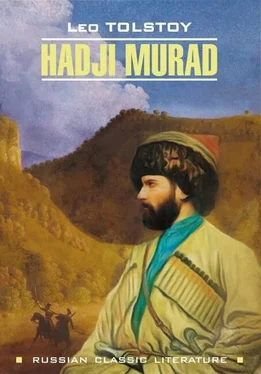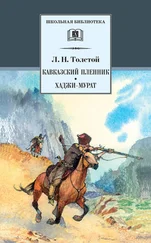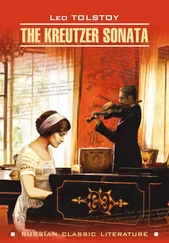Лев Толстой - Hadji Murad / Хаджи-Мурат. Книга для чтения на английском языке
Здесь есть возможность читать онлайн «Лев Толстой - Hadji Murad / Хаджи-Мурат. Книга для чтения на английском языке» — ознакомительный отрывок электронной книги совершенно бесплатно, а после прочтения отрывка купить полную версию. В некоторых случаях можно слушать аудио, скачать через торрент в формате fb2 и присутствует краткое содержание. Год выпуска: 2019, ISBN: 2019, Издательство: Литагент Каро, Жанр: Классическая проза, Русская классическая проза, Прочая научная литература, на английском языке. Описание произведения, (предисловие) а так же отзывы посетителей доступны на портале библиотеки ЛибКат.
- Название:Hadji Murad / Хаджи-Мурат. Книга для чтения на английском языке
- Автор:
- Издательство:Литагент Каро
- Жанр:
- Год:2019
- ISBN:978-5-9925-1227-4
- Рейтинг книги:3 / 5. Голосов: 1
-
Избранное:Добавить в избранное
- Отзывы:
-
Ваша оценка:
- 60
- 1
- 2
- 3
- 4
- 5
Hadji Murad / Хаджи-Мурат. Книга для чтения на английском языке: краткое содержание, описание и аннотация
Предлагаем к чтению аннотацию, описание, краткое содержание или предисловие (зависит от того, что написал сам автор книги «Hadji Murad / Хаджи-Мурат. Книга для чтения на английском языке»). Если вы не нашли необходимую информацию о книге — напишите в комментариях, мы постараемся отыскать её.
Hadji Murad / Хаджи-Мурат. Книга для чтения на английском языке — читать онлайн ознакомительный отрывок
Ниже представлен текст книги, разбитый по страницам. Система сохранения места последней прочитанной страницы, позволяет с удобством читать онлайн бесплатно книгу «Hadji Murad / Хаджи-Мурат. Книга для чтения на английском языке», без необходимости каждый раз заново искать на чём Вы остановились. Поставьте закладку, и сможете в любой момент перейти на страницу, на которой закончили чтение.
Интервал:
Закладка:
“He asks to be sent back to Grozny with a convoy of twenty or thirty picked Cossacks who would serve him as a protection against foes and us as a guarantee of his good faith.
“You will understand, dear Prince, that I have been much perplexed by all this, for do what I will a great responsibility rests on me. It would be in the highest degree rash to trust him entirely, yet in order to deprive him of all means of escape we should have to lock him up, and in my opinion that would be both unjust and impolitic. A measure of that kind, the news of which would soon spread over the whole of Daghestan, would do us great harm by keeping back those who are now inclined more or less openly to oppose Shamil (and there are many such), and who are keenly watching to see how we treat the Imam’s bravest and most adventurous officer now that he has found himself obliged to place himself in our hands. If we treat Hadji Murad as a prisoner all the good effect of the situation will be lost. Therefore I think that I could not act otherwise than as I have done, though at the same time I feel that I may be accused of having made a great mistake if Hadji Murad should take it into his head to escape again. In the service, and especially in a complicated situation such as this, it is difficult, not to say impossible, to follow any one straight path without risking mistakes and without accepting responsibility, but once a path seems to be the right one I must follow it, happen what may.
“I beg of you, dear Prince, to submit this to his Majesty the Emperor for his consideration; and I shall be happy if it pleases our most august monarch to approve my action.
“All that I have written above I have also written to Generals Zavodovsky and Kozlovsky, to guide the latter when communicating direct with Hadji Murad whom I have warned not to act or go anywhere without Kozlovsky’s consent. I also told him that it would be all the better of us if he rode out with our convoy, as otherwise Shamil might spread a rumor that we were keeping him prisoner, but at the same time I made him promise never to go to Vozdvizhensk, because my son, to whom he first surrendered and whom he looks upon as his kunak (friend), is not the commander of that place and some unpleasant misunderstanding might easily arise. In any case Vozdvizhensk lies too near a thickly populated hostile settlement, which for the intercourse with his friends which he desires, Grozny is in all respects suitable.
“Besides the twenty chosen Cossacks who at his own request are to keep close to him, I am also sending Captain Loris-Melikov – a worthy, excellent, and highly intelligence officer who speaks Tartar, and knows Hadji Murad well and apparently enjoys his full confidence. During the ten days that Hadji Murad has spent here, he has, however, lived in the same house with Lieutenant-Colonel Prince Tarkhanov, who is in command of the shoushin District and is here on business connected with the service. He is a truly worthy man whom I trust entirely. He also has won Hadji Murad’s confidence, and through him alone – as he speaks Tartar perfectly – we have discussed the most delicate and secret matters. I have consulted Tarkhanov about Hadji Murad, and he fully agrees with me that it was necessary either to act as I have done, or to put Hadji Murad in prison and guard him in the strictest manner (for if we once treat him badly he will not be easy to hold), or else to remove him from the country altogether. But these two last measures would not only destroy all the advantage accruing to us from Hadji Murad’s quarrel with Shamil, but would inevitably check any growth of the present insubordination, and possible future revolt, of the people against Shamil’s power. Prince Tarkhanov tells me he himself has no doubt of Hadji Murad’s truthfulness, and that Hadji Murad is convinced that Shamil will never forgive him but would have him executed in spite of any promise of forgiveness. The only thing Tarkhanov has noticed in his intercourse with Hadji Murad that might cause any anxiety, is his attachment to his religion. Tarkhanov does not deny that Shamil might influence Hadji Murad from that side. But as I have already said, he will never persuade Hadji Murad that he will not take his life sooner or later should the latter return to him.
“This, dear Prince, is all I have to tell you about this episode in our affairs here.”
Chapter XV
The report was dispatched from Tiflis on the 24th of December 1851, and on New Year’s Eve a courier, having overdriven a dozen horses and beaten a dozen drivers till they bled, delivered it to Prince Chernyshov who at that time was Minister of War; and on the 1st of January 1852 Chernyshov took Vorontsov’s report, among other papers, to the Emperor Nicholas.
Chernyshov disliked Vorontsov because of the general respect in which the latter was held and because of his immense wealth, and also because Vorontsov was a real aristocrat while Chernyshov, after all, was a parvenu, but especially because the Emperor was particularly well disposed towards Vorontsov. Therefore at every opportunity Chernyshov tried to injure Vorontsov.
When he had last presented the report about Caucasian affairs he had succeeded in arousing Nicholas’s displeasure against Vorontsov because – through the carelessness of those in command – almost the whole of a small Caucasian detachment had been destroyed by the mountaineers. He now intended to present the steps taken by Vorontsov in relation to Hadji Murad in an unfavorable light. He wished to suggest to the Emperor that Vorontsov always protected and even indulged the natives to the detriment of the Russians, and that he had acted unwisely in allowing Hadji Murad to remain in the Caucasus for there was every reason to suspect that he had only come over to spy on our means of defense, and that it would therefore be better to transport him to Central Russia and make use of him only after his family had been rescued from the mountaineers and it had become possible to convince ourselves of his loyalty.
Chernyshov’s plan did not succeed merely because on that New Year’s Day Nicholas was in particularly bad spirits, and out of perversity would not have accepted any suggestion whatever from anyone, least of all from Chernyshov whom he only tolerated – regarding him as indispensable for the time being but looking upon him as a blackguard, for Nicholas knew of his endeavors at the trial of the Decembrists to secure the conviction of Zachary Chernyshov, and of his attempt to obtain Zachary’s property for himself. So thanks to Nicholas’s ill temper Hadji Murad remained in the Caucasus, and his circumstances were not changed as they might have been had Chernyshov presented his report at another time.
It was half-past nine o’clock when through the mist of the cold morning (the thermometer showed 13 degrees below zero Fahrenheit) Chernyshov’s fat, bearded coachman, sitting on the box of a small sledge (like the one Nicholas drove about in) with a sharp-angled, cushion-shaped azure velvet cap on his head, drew up at the entrance of the Winter Palace and gave a friendly nod to his chum, Prince Dolgoruky’s coachman – who having brought his master to the palace had himself long been waiting outside, in his big coat with the thickly wadded skirts, sitting on the reins and rubbing his numbed hands together. Chernyshov had on a long cloak with a large cap and a fluffy collar of silver beaver, and a regulation three-cornered had with cocks’ feathers. He threw back the bearskin apron of the sledge and carefully disengaged his chilled feet, on which he had no over-shoes (he prided himself on never wearing any). Clanking his spurs with an air of bravado he ascended the carpeted steps and passed through the hall door which was respectfully opened for him by the porter, and entered the hall. Having thrown off his cloak which an old Court lackey hurried forward to take, he went to a mirror and carefully removed the hat from his curled wig. Looking at himself in the mirror, he arranged the hair on his temples and the tuft above his forehead with an accustomed movement of his old hands, and adjusted his cross, the shoulder-knots of his uniform, and his large-initialled epaulets, and then went up the gently ascending carpeted stairs, his not very reliable old legs feebly mounting the shallow steps. Passing the Court lackeys in gala livery who stood obsequiously bowing, Chernyshov entered the waiting-room. He was respectfully met by a newly appointed aide-decamp of the Emperor’s in a shining new uniform with epaulets and shoulder-knots, whose face was still fresh and rosy and who had a small black mustache, and the hair on his temples brushed towards his eyes in the same way as the Emperor.
Читать дальшеИнтервал:
Закладка:
Похожие книги на «Hadji Murad / Хаджи-Мурат. Книга для чтения на английском языке»
Представляем Вашему вниманию похожие книги на «Hadji Murad / Хаджи-Мурат. Книга для чтения на английском языке» списком для выбора. Мы отобрали схожую по названию и смыслу литературу в надежде предоставить читателям больше вариантов отыскать новые, интересные, ещё непрочитанные произведения.
Обсуждение, отзывы о книге «Hadji Murad / Хаджи-Мурат. Книга для чтения на английском языке» и просто собственные мнения читателей. Оставьте ваши комментарии, напишите, что Вы думаете о произведении, его смысле или главных героях. Укажите что конкретно понравилось, а что нет, и почему Вы так считаете.












